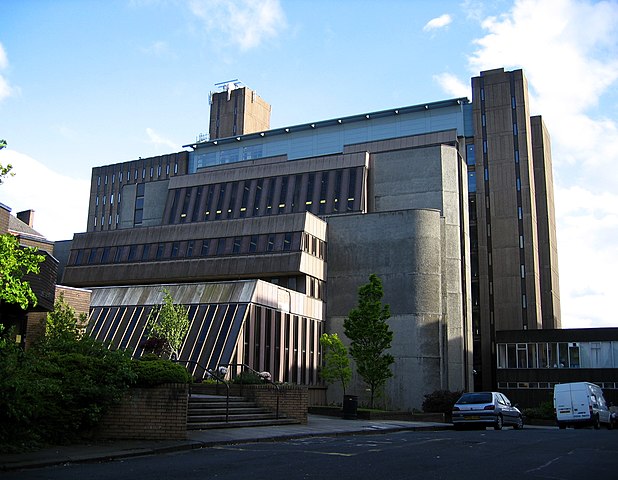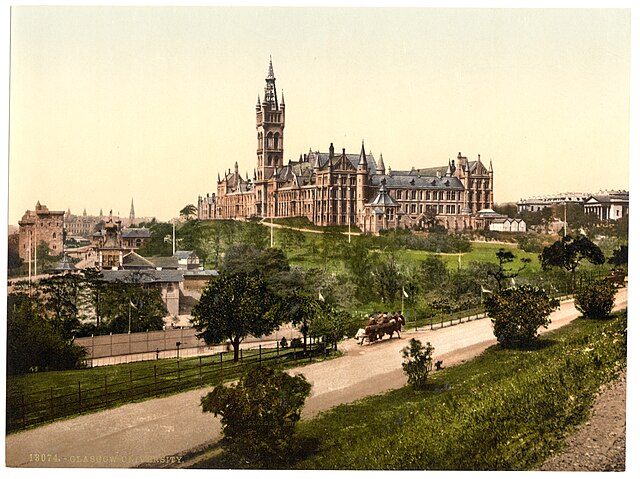
University of Glasgow Library, Scotland, the United Kingdom
The University of Glasgow Library in Scotland, the United Kingdom, is one of the oldest and largest university libraries in Europe.
The Thammasat University Library collection includes several books published at the University of Glasgow.
At the turn of the 21st century, the main library building held over 1,300,000 catalogued print books, and more than 50,000 journals. In total, the university library system, including branch libraries, now holds approximately 2.5 million books and journals.
The current 12-story building opened in 1968.
Dr. Susan Ashworth is Executive Director, Information Services at the University of Glasgow.
The Library’s Special Collections are classed as being of national and international importance. Its subject strengths include art, languages, literature, history and the history of law, science and medicine, represented by over 200,000 manuscript items and around 200,000 printed works, 1,060 of which were printed before 1501.
The holdings of medieval and renaissance manuscripts are of international status.
As the library website explains,
The Special Collections Department houses an outstanding library of old, rare and unique material, including many illuminated medieval and renaissance manuscripts of international importance, and more than 10,000 books that were printed before 1601. Other media such as music scores, drawings, early photographs, maps and ephemera are well represented, displaying the wide range and subject coverage of the collections.
Acquired by the University of Glasgow since its foundation in 1451, these collections span two millennia and reflect over five hundred years of scholarship, providing a remarkable resource for the University, many visiting researchers, and the local community.
The best known and most treasured of the collections is the Hunterian Library, one of the finest 18th century libraries to survive intact. Dr William Hunter (1718-83), Physician Extraordinary to Queen Charlotte, studied at Glasgow before moving to London in 1740, where he remained until his death…
Amongst the many treasures preserved at Glasgow in other collections may be found:
- a Shakespeare first folio
- William Blake’s illuminated book Europe: a prophecy (one of only ten surviving copies)
- papyrus documents from Roman Egypt
- Mozart’s penultimate letter
- an early 17th century lute book…
WHAT ARE SPECIAL COLLECTIONS
Special Collections are those collections of books and archives considered important (or “special”) enough to be preserved for future generations. They are often very old, rare or unique, or fragile. Usually they have significant research and/or cultural value.
Such collections are often the personal libraries or archives of individuals. Usually named after the original owner, these collections have been consciously kept together and may reflect their interests. Special Collections can also be “artificially” created by institutions to create primary research resources to support the needs of their user groups – to support teaching and learning in the case of universities, for example. Sometimes the separate items within a collection are not in themselves “rare” or “valuable” but gain importance from the context in which they were collected or because they form a critical mass of material on a particular topic (i.e. the sum is greater than the parts).
To help preserve material for the future, Special Collections are managed and housed separately from the more mainstream collections so that environmental factors such as temperature, humidity and light levels can be carefully controlled and monitored. To keep the collections safe and secure, they are usually available to researchers on a reference only basis in a designated reading room. There are special rules and regulations to ensure the material is handled correctly and to safeguard it for the future. Remember that the rules and regulations are there to help preserve the material and not to inconvenience you.

McDucation: Studying in Scotland
Chatgaew (Rin) Jutachalatip who earned a master of science degree in International Business and Emerging Markets in 2006, commented in an alumni journal:
When I was studying my MSc, the number of Thai students in Scotland was low. Since graduating, I cofounded a company, McDucation, which specialises in recruiting students to Scotland. It was the first study-in-Scotland agency in the world. Thai students are now among the top ten of overseas students in the UK (7th).
In 2005, fewer than 50 Thai students went to study in Scotland. Indeed, fewer Thai students went to Scotland to study than to Iran or Iraq.
Part of the reason may have been that Thai people were generally unaware of Scotland, apart from Hollywood movies which gave an underdeveloped image of the country.
For this reason, Thai alumni of institutions of higher learning in Scotland tried to persuade and educate friends and others about choosing to study in Scotland. Finally they had the idea to establish an organization to promote education in Scotland for Thai students.
A plan for McDucation – Study in Scotland was drafted and presented it to agencies such as Education Scotland, Visit Scotland, Scottish Executives, and Fresh Talent – Working in Scotland Scheme, as well as universities in Scotland. It received a positive response, and McDucation was established as the first Scottish educational institution in the world.
The goal was to educate Thai people students about aspects of study in Scotland, as opposed to England, for example in legal, public health, and educational matters.
Scotland’s academic and academic achievements are Second to none in the world, as Sir Winston Churchill said, “Of all the small nations of this earth, perhaps only the ancient Greeks surpass the Scots in their contribution to mankind.”
McDucation cites a quote found abundantly on the internet in which Churchill once supposedly said: Of all the small nations of this earth, perhaps only the ancient Greeks surpass the Scots in their contribution to mankind.
Scottish writers and researchers have failed to verify this statement or find out if and where Churchill really said it.
Churchill famously enjoyed drinking Scotch whisky, and also liked Dundee cake, another specialty of Scotland, as his favorite dessert. However he also had more difficult experiences on a visit to Dundee when he tried to eat breakfast. He wrote to his wife Clementine on that occasion about Dundee: This city will kill me. Halfway through my kipper this morning an enormous maggot crawled out and flashed his teeth at me.
Happily, Scotland is also the birthplace of a wide range of modern academic arts, including economics (Adam Smith) and engineering (William Rankine).
Each year, more Thai students enroll in academic programs in Scotland.

(All images courtesy of Wikimedia Commons)
